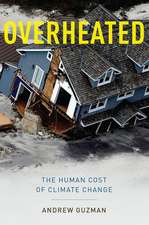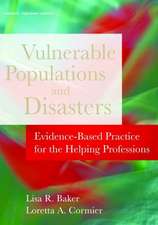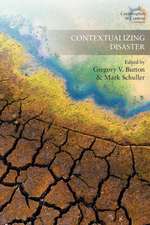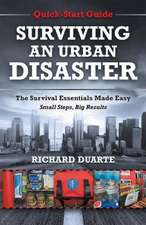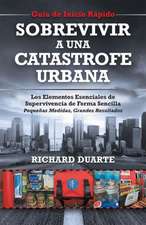Dull Disasters?: How planning ahead will make a difference
Autor Daniel J. Clarke, Stefan Derconen Limba Engleză Hardback – 14 iul 2016
Preț: 120.81 lei
Preț vechi: 137.55 lei
-12% Nou
Puncte Express: 181
Preț estimativ în valută:
23.12€ • 24.02$ • 19.20£
23.12€ • 24.02$ • 19.20£
Carte tipărită la comandă
Livrare economică 22-28 ianuarie 25
Livrare express 27 decembrie 24 - 02 ianuarie 25 pentru 111.46 lei
Preluare comenzi: 021 569.72.76
Specificații
ISBN-13: 9780198785576
ISBN-10: 0198785577
Pagini: 160
Dimensiuni: 144 x 227 x 19 mm
Greutate: 0.29 kg
Editura: OUP OXFORD
Colecția OUP Oxford
Locul publicării:Oxford, United Kingdom
ISBN-10: 0198785577
Pagini: 160
Dimensiuni: 144 x 227 x 19 mm
Greutate: 0.29 kg
Editura: OUP OXFORD
Colecția OUP Oxford
Locul publicării:Oxford, United Kingdom
Recenzii
Dull Disasters is a timely publication when the world needs to focus its resources, and communities facing natural disasters should be better prepared to face and bounce back from shocks. It is highly relevant to the IFRC with its network of 190 national societies whose volunteers form the last mile in community engagement. It rightfully shifts the discourse from counting how many we've reached to how few needs are left unmet thus making disasters dull. The message of better preparedness, networking and more robust decision making and financial tools will help us achieve the resilience we need in communities.
With innovations in science and finance, making disasters 'dull' must be our aim. Shocks don't need to become full blown disasters, if we better anticipate and pre-plan for shocks, and reinforce local response capacity. The World Humanitarian Summit and what flows from it provide a key opportunity to make this happen.
A thought-provoking book with a selection of excellent ideas for managing risks. For a country like Ethiopia subject to frequent drought the ideas on planning for and managing shocks in advance makes sense. Climate change makes it even more likely that the frequency of these shocks will increase in the future, and we need to plan for this. This kind of approach, linking the public and private sector in insuring and financing disasters, gives us much to take and consider.
This book is a timely and valuable contribution to an important global conversation on addressing risk and vulnerability. Disasters are becoming more severe and the impact of climate change - the ultimate threat multiplier - is exacerbating food insecurity, water scarcity, conflict and migration. In Dull Disasters, the authors offer a persuasive message: today's disasters need leaders who do not just respond emotionally and energetically to crises, but leaders who use political, legal, and financial mechanisms that result in better preparedness.
Countries have a great deal to gain from anticipating the use of a portfolio of financial instruments to improve their capacity to cope with disasters and manage catastrophic risks. Doing so requires careful diagnostics, design, experimentation, and evaluation. Yet, this is a vastly under-researched topic. In that perspective, the book makes a unique contribution to the literature by critically summarizing the current state of research on this issue and constructing a research agenda. This will be most useful in guiding future research on the management of disaster risk and recovery.
Natural catastrophes are increasing in frequency and severity. What is more, the gap between economic and insured losses has remained stubbornly large. The consequences are especially severe in emerging and developing countries, which are both the worst hit and the least prepared. Tools exist to narrow that gap using innovative solutions that can help countries, cities and individuals preserve hard-won development gains even in the face of floods, earthquakes, adverse weather and other setbacks. This book highlights a sensible way forward to make the world more resilient.
Given the increasing frequency and severity of natural disasters brought on by climate change and the stress of massive numbers of displaced people placed on all of society due to man-made disasters, planning for disasters is increasingly crucial for society. This book brings the needs, principles and processes together in a highly readable fashion. It is a must read for all policy makers and students of public, private, and non-government institutions.
With innovations in science and finance, making disasters 'dull' must be our aim. Shocks don't need to become full blown disasters, if we better anticipate and pre-plan for shocks, and reinforce local response capacity. The World Humanitarian Summit and what flows from it provide a key opportunity to make this happen.
A thought-provoking book with a selection of excellent ideas for managing risks. For a country like Ethiopia subject to frequent drought the ideas on planning for and managing shocks in advance makes sense. Climate change makes it even more likely that the frequency of these shocks will increase in the future, and we need to plan for this. This kind of approach, linking the public and private sector in insuring and financing disasters, gives us much to take and consider.
This book is a timely and valuable contribution to an important global conversation on addressing risk and vulnerability. Disasters are becoming more severe and the impact of climate change - the ultimate threat multiplier - is exacerbating food insecurity, water scarcity, conflict and migration. In Dull Disasters, the authors offer a persuasive message: today's disasters need leaders who do not just respond emotionally and energetically to crises, but leaders who use political, legal, and financial mechanisms that result in better preparedness.
Countries have a great deal to gain from anticipating the use of a portfolio of financial instruments to improve their capacity to cope with disasters and manage catastrophic risks. Doing so requires careful diagnostics, design, experimentation, and evaluation. Yet, this is a vastly under-researched topic. In that perspective, the book makes a unique contribution to the literature by critically summarizing the current state of research on this issue and constructing a research agenda. This will be most useful in guiding future research on the management of disaster risk and recovery.
Natural catastrophes are increasing in frequency and severity. What is more, the gap between economic and insured losses has remained stubbornly large. The consequences are especially severe in emerging and developing countries, which are both the worst hit and the least prepared. Tools exist to narrow that gap using innovative solutions that can help countries, cities and individuals preserve hard-won development gains even in the face of floods, earthquakes, adverse weather and other setbacks. This book highlights a sensible way forward to make the world more resilient.
Given the increasing frequency and severity of natural disasters brought on by climate change and the stress of massive numbers of displaced people placed on all of society due to man-made disasters, planning for disasters is increasingly crucial for society. This book brings the needs, principles and processes together in a highly readable fashion. It is a must read for all policy makers and students of public, private, and non-government institutions.
Notă biografică
Daniel J. Clarke is an actuary and development economist who works as a Senior Insurance Specialist in the Disaster Risk Financing & Insurance Program, a joint program between the World Bank Group and the Global Facility for Disaster Reduction and Recovery. Over the last decade he has worked with more than twenty developing country governments to develop efficient, cost-effective solutions for enhanced financial protection against disasters. He has a first class degree from Cambridge University in Mathematics in Computer Science and a D.Phil. in Economics from the University of Oxford, and is a Fellow of the Institute of Actuaries.Stefan Dercon is Professor of Economic Policy at the University of Oxford, and a Professorial Fellow of Wolfson College. He is also Chief Economist of the UK Department for International Development. Previously he taught in Belgium and at the University of Addis Ababa. His interest is in applying microeconomics and statistics to problems of development. He has worked on risk and poverty, agriculture and rural institutions, political economy, childhood poverty, social and geographic mobility, micro-insurance, and measurement issues related to poverty and vulnerability.






